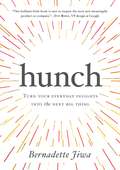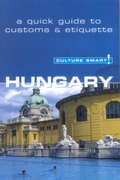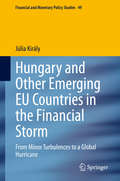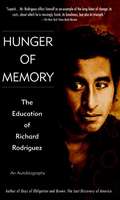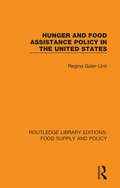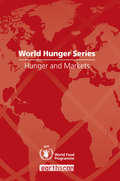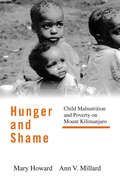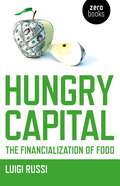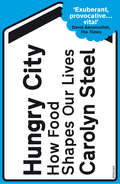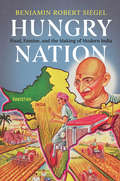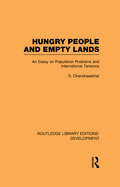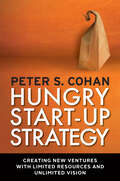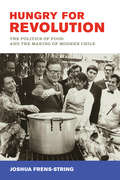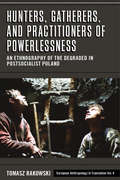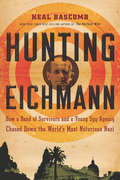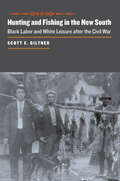- Table View
- List View
Hunch: Turn Your Everyday Insights Into The Next Big Thing
by Bernadette JiwaWhere will your next bigidea come from?Analyzing hard data? A corporate brainstorming session? Customer focus groups? Or closer to home? Successful people don’t wait for proof that their idea will work. They learn to trust their gut and go.In Hunch, international bestselling author and business adviser Bernadette Jiwa shows you how to harness the power of your intuition so you can recognize opportunities others miss and create the breakthrough idea the world is waiting for. She explores inspired hunches, from one that led to the launch of the breakout GoldieBlox brand to another that helped a doctor reduce infant mortality rates around the world.Filled with success stories, reflection exercises, and writing prompts, Hunch is the indispensable guide to embracing your unique potential and discovering your own winning ideas.
Hundred-Year War: Coke vs. Pepsi--1890s-1990s
by David Lane Chiaki MoriguchiThrough their competitive battle, Coca-Cola and PepsiCo have created a stable and highly profitable duopoly in the U.S. soft drink industry. As the domestic industry matured and the cola wars moved to international markets, Coke and Pepsi tried to redesign their competitive strategies as well as the vertical structure of their corporations. A rewritten version of an earlier case by Michael E. Porter and David B. Yoffie.
Hungary - Culture Smart!
by Brian McleanCulture Smart! provides essential information on attitudes, beliefs and behavior in different countries, ensuring that you arrive at your destination aware of basic manners, common courtesies, and sensitive issues. These concise guides tell you what to expect, how to behave, and how to establish a rapport with your hosts. This inside knowledge will enable you to steer clear of embarrassing gaffes and mistakes, feel confident in unfamiliar situations, and develop trust, friendships, and successful business relationships.Culture Smart! offers illuminating insights into the culture and society of a particular country. It will help you to turn your visit-whether on business or for pleasure-into a memorable and enriching experience. Contents include* customs, values, and traditions* historical, religious, and political background* life at home* leisure, social, and cultural life* eating and drinking* dos, don'ts, and taboos* business practices* communication, spoken and unspoken"Culture Smart has come to the rescue of hapless travellers." Sunday Times Travel"... the perfect introduction to the weird, wonderful and downright odd quirks and customs of various countries." Global Travel"...full of fascinating-as well as common-sense-tips to help you avoid embarrassing faux pas." Observer"...as useful as they are entertaining." Easyjet Magazine"...offer glimpses into the psyche of a faraway world." New York Times
Hungary and Other Emerging EU Countries in the Financial Storm: From Minor Turbulences to a Global Hurricane (Financial and Monetary Policy Studies #49)
by Júlia KirályThis book analyzes the banking crisis and the events surrounding it in Hungary and other emerging EU member countries in 2007-2013. Written by Júlia Király, a former policymaker, and the Deputy Governor of the Hungarian Central Bank at the time of the crisis, it also offers a firsthand account of the processes in and responses to the financial crisis. While there is extensive literature on the crisis, most of it focuses on the US or the Eurozone, sometimes mentioning the “emerging world” in passing. However, Central and Eastern Europe experienced the crisis very differently than other emerging countries. In the pre-crisis years, the region in accession to the EU attracted abundant fresh capital, but the seemingly unconstrained global liquidity fuelled credit bubbles. After the Lehman crisis, capital rapidly fled these countries. In this part of the world, the recession proved to be much worse than elsewhere, with double-digit growth soon turning into a double-digit decline in GDP. Several countries had to turn to the IMF and the EU for stand-by credit. Based on her own inside experience as a top central banker, the author offers a personal yet professional analysis of the causes and consequences of the financial hurricane.
Hungary: Economic Crisis and a Shift to the Right
by Rafael Di Tella Jacob Kuipers Matthew Weinzierlcase
Hungary: Economic Policies for Sustainable Growth
by International Monetary FundA report from the International Monetary Fund.
Hungary: Selected Issues and Statistical Appendix
by International Monetary FundA report from the International Monetary Fund.
Hunger Of Memory: The Education Of Richard Rodriguez
by Richard RodriguezHunger of Memory is the story of Mexican-American Richard Rodriguez, who begins his schooling in Sacramento, California, knowing just 50 words of English, and concludes his university studies in the stately quiet of the reading room of the British Museum. Here is the poignant journey of a "minority student" who pays the cost of his social assimilation and academic success with a painful alienation - from his past, his parents, his culture - and so describes the high price of "making it" in middle-class America. Provocative in its positions on affirmative action and bilingual education, Hunger of Memory is a powerful political statement, a profound study of the importance of language . . . and the moving, intimate portrait of a boy struggling to become a man. From the Paperback edition. Note: The author uses British punctuation.
Hunger and Food Assistance Policy in the United States (Routledge Library Editions: Food Supply and Policy)
by Regina Galer-UntiOriginally published in 1995. This study collects and analyses the results of hunger studies carried out in the United States during the 1980s, whether national, state or local. It also reviews the history and development of food assistance programs and policy. This is an unusual and fascinating study of public health policy which employs meta-analysis to investigate the sociodemographic factors affecting those seeking food assistance and draws recommendations for future studies and to feed into policy decisions.
Hunger and Markets: World Hunger Series
by United Nations World Food ProgrammeHunger and Markets is the third volume of the UN World Food Programme's World Hunger Series - created to help promote a better understanding of the choices confronting leaders as they work to fight hunger. It appears at a crucial time, with food prices at high levels, a severe global financial crisis and vulnerable households around the world endangering their future health, education and productivity by reducing both the quality and the quantity of their food intake. Hunger and Markets explores the complex and multifaceted interactions between the availability of and access to food and the operations of markets. The structure and dynamics of food markets and the threats and opportunities markets generate are crucial for the access to food for billions of people. Markets are also critical in averting or mitigating food shortages and hunger by adjusting to shocks, reducing vulnerability and coping with crises. Whether markets help or harm the hungry poor is a function of markets' institutions, infrastructure and policies. This volume analyzes the workings of markets in order to identify the sources of market failures in addressing hunger and malnutrition, and to highlight the ways in which they can be improved. The report sets out the ways in which programme design and policy formulation can build on the strengths of markets to prevent possible negative effects, and will be essential reading for all those involved in the fight against world hunger. Published with World Food Programme
Hunger and Shame: Child Malnutrition and Poverty on Mount Kilimanjaro
by Mary Howard Ann V. MillardIn discussing the moral and practical dilemmas posed by the malnourished children in Mount Kilimanjaro, the authors explore the shame associated with child hunger in relation to social organization, colonial history and global economy.
Hunger of Memory: An Autobiography
by Richard RodriguezHere is the poignant journey of a "minority student" who pays the cost of his social assimilation and academic success with a painful alienation -- from his past, his parents, his culture -- and so describes the high price of "making it" in middle-class America.
Hungry Capital: The Financialization of Food
by Luigi RussiOver the past thirty years, the ability of global finance to affect aspects of everyday life has been increasing at an unprecedented rate. The world of food bears vivid testimony to this tendency, through the scars opened by the 2008 world food price crisis, the iron fist of retailing giants that occupy the supply chain and the unsustainable ecological footprint left behind by global production networks. Hungry Capital offers a rigorous analysis of the influence that financial imperatives exert on the food economy at different levels: from the direct use of edible commodities as an object of speculation to the complex food chains set up by manufacturers and supermarkets. It argues that the circular compulsion to build profits upon profits that global finance injects into the world of food restructures the basic nurturing relationship between man and nature into a streamlined process from which value has to be mined. The end result is a monstrous Leviathan that holds together while -- at every step -- risks to crumble.
Hungry City: How Food Shapes Our Lives
by Carolyn Steel'Cities cover just 2% of the world’s surface, but consume 75% of the world’s resources’.The relationship between food and cities is fundamental to our everyday lives. Food shapes cities and through them it moulds us - along with the countryside that feeds us. Yet few of us are conscious of the process and we rarely stop to wonder how food reaches our plates. Hungry City examines the way in which modern food production has damaged the balance of human existence, and reveals that we have yet to resolve a centuries-old dilemma - one which holds the key to a host of current problems, from obesity and the inexorable rise of the supermarkets, to the destruction of the natural world.Original, inspiring and written with infectious enthusiasm and belief, Hungry City illuminates an issue that is fundamental to us all.
Hungry Nation: Food, Famine, And The Making Of Modern India
by Benjamin Robert SiegelThis ambitious and engaging new account of independent India's struggle to overcome famine and malnutrition in the twentieth century traces Indian nation-building through the voices of politicians, planners, and citizens. <P><P>Siegel explains the historical origins of contemporary India's hunger and malnutrition epidemic, showing how food and sustenance moved to the center of nationalist thought in the final years of colonial rule. Independent India's politicians made promises of sustenance and then qualified them by asking citizens to share the burden of feeding a new and hungry state. Foregrounding debates over land, markets, and new technologies, Hungry Nation interrogates how citizens and politicians contested the meanings of nation-building and citizenship through food, and how these contestations receded in the wake of the Green Revolution. Drawing upon meticulous archival research, this is the story of how Indians challenged meanings of welfare and citizenship across class, caste, region, and gender in a new nation-state.<P> The first comprehensive historical account of independent India's struggle to provide food for all in the twentieth century.<P> Draws from archival sources in Hindi, Urdu, Bengali, and English collected from archives on three continents.<P> Juxtaposes the accounts of politicians, bureaucrats, and planners with those of citizens themselves.
Hungry People and Empty Lands: An Essay on Population Problems and International Tensions (Routledge Library Editions: Development)
by S. ChandrasekharFirst published in 1954, this reissue deals with the problem of international tensions arising from demographic and fertility differences, with special reference to such heavily populated Asian countries as China, Japan and India.
Hungry Start-up Strategy: Creating New Ventures with Limited Resources and Unlimited Vision
by Peter S. CohanEntrepreneurs are hungry. But it’s not just because they’re living on ramen and adrenaline while they pour their all into their business. Peter Cohan has found it’s something deeper: a hunger to create the kind of world they want to work in. To leave a legacy, they build carefully with limited resources and maintain control of the venture’s direction. For years, students have told Cohan that the seminal business strategy guide, Michael Porter’s Competitive Strategy, was too big-company focused. So Cohan—who once worked with Porter—has written the first business strategy book to address start-ups’ very different challenges. Cohan focuses on six key start-up choices—setting goals, picking markets, raising capital, building teams, gaining market share, and adapting to change—explaining the unique rules start-ups must follow. For example, when setting goals, large corporations try to maximize their long-term return on equity, but resource-poor start-ups have to plan by setting a series of short-term goals—and how they do this will mean the difference between blazing a trail or flaming out. When entering a new market, well-fed companies can invest substantial time and capital before ever launching a product, but hungry start-ups must get an adequate prototype in front of customers fast, get feedback, and quickly develop a viable business model or they’ll starve to death. For each of these six areas, Cohan provides a decision-making approach and lively case studies of what actual entrepreneurs have done. He extracts hard-hitting lessons not only for start-ups but also for investors and even established companies. Hungry Start-up Strategy offers a full menu of vital information for anyone seeking to cook up a thriving business from scratch.
Hungry for Revolution: The Politics of Food and the Making of Modern Chile
by Joshua Frens-StringHungry for Revolution tells the story of how struggles over food fueled the rise and fall of Chile's Popular Unity coalition and one of Latin America's most expansive social welfare states. Reconstructing ties among workers, consumers, scientists, and the state, Joshua Frens-String explores how Chileans across generations sought to center food security as a right of citizenship. In so doing, he deftly untangles the relationship between two of twentieth-century Chile's most significant political and economic processes: the fight of an emergent urban working class to gain reliable access to nutrient-rich foodstuffs and the state's efforts to modernize its underproducing agricultural countryside.
Hunter Business Group: TeamTBA
by Das Narayandas Elizabeth CaputoThe Hunter Business Group (HBG), a direct marketing consulting firm specializing in reorganizing the sales and marketing efforts of industrial firms, uses integrated customer contact technologies (including field sales, telephone, and mail) as a means of "revolutionizing the face of business-to-business (b2b) direct marketing." The firm operates under the theory that a seller's communications provide genuine value to a customer, and that successful direct marketing programs result in solid relationships, high retention rates, and increased profitability for the customer. This case highlights, in detail, HBG's implementation of its approach for Star Oil's tire, battery, and accessory (TBA) business that has been facing declining market share and profitability in the face of ever-increasing competition.
Hunters, Gatherers, and Practitioners of Powerlessness: An Ethnography of the Degraded in Postsocialist Poland (European Anthropology in Translation #6)
by Tomasz RakowskiThe socio-economic transformations of the 1990s have forced many people in Poland into impoverishment. Hunters, Gatherers, and Practitioners of Powerlessness gives a dramatic account of life after this degradation, tracking the experiences of unemployed miners, scrap collectors, and poverty-stricken village residents. Contrary to the images of passivity, resignation, and helplessness that have become powerful tropes in Polish journalism and academic writing, Tomasz Rakowski traces the ways in which people actively reconfigure their lives. As it turns out, the initial sense of degradation and helplessness often gives way to images of resourcefulness that reveal unusual hunting-and-gathering skills.
Hunting Eichmann: How a Band of Survivors and a Young Spy Agency Chased Down the World's Most Notorious Nazi
by Neal BascombThe first complete narrative of the pursuit & capture of SS Nazi officer and Holocaust architect Adolf Eichmann, by a New York Times–bestselling author.When the Allies stormed Berlin in the last days of the Third Reich, Adolf Eichmann shed his SS uniform and vanished. Following his escape from two American POW camps, his retreat into the mountains and out of Europe, and his path to an anonymous life in Buenos Aires, his pursuers are a bulldog West German prosecutor, a blind Argentinean Jew and his beautiful daughter, and a budding, ragtag spy agency called the Mossad, whose operatives have their own scores to settle (and whose rare surveillance photographs are published here for the first time).The capture of Eichmann and the efforts by Israeli agents to secret him out of Argentina to stand trial is the stunning conclusion to this thrilling historical account, told with the kind of pulse-pounding detail that rivals anything you’d find in great spy fiction.Includes Mossad’s Rare Surveillance PhotographsPraise for Hunting Eichmann“A fantastic true spy story.” —Associated Press“[Bascomb’s] work is well researched, including interviews with former Israeli operatives and El Al staff who participated in the capture, as well as Argentine fascists. This is a gripping read.” —Publishers Weekly“An outstanding account of a sustained and worthy manhunt.” —Booklist
Hunting and Fishing in the New South: Black Labor and White Leisure after the Civil War (The Johns Hopkins University Studies in Historical and Political Science #126)
by Scott E. GiltnerThis innovative study re-examines the dynamics of race relations in the post–Civil War South from an altogether fresh perspective: field sports.In the late nineteenth and early twentieth centuries, wealthy white men from Southern cities and the industrial North traveled to the hunting and fishing lodges of the old Confederacy—escaping from the office to socialize among like-minded peers. These sportsmen depended on local black guides who knew the land and fishing holes and could ensure a successful outing. For whites, the ability to hunt and fish freely and employ black laborers became a conspicuous display of their wealth and social standing. But hunting and fishing had been a way of life for all Southerners—blacks included—since colonial times. After the war, African Americans used their mastery of these sports to enter into market activities normally denied people of color, thereby becoming more economically independent from their white employers. Whites came to view black participation in hunting and fishing as a serious threat to the South’s labor system. Scott E. Giltner shows how African-American freedom developed in this racially tense environment—how blacks' sense of competence and authority flourished in a Jim Crow setting. Giltner’s thorough research using slave narratives, sportsmen’s recollections, records of fish and game clubs, and sporting periodicals offers a unique perspective on the African-American struggle for independence from the end of the Civil War to the 1920s.
Hunting with Barracudas: My Life in Hollywood with the Legendary Iris Burton
by Chris SnyderHollywood’s famous child star agent Iris Burton launched the careers of the world’s current movie stars and celebrities including Drew Barrymore, Tori Spelling, River and Joaquin Phoenix, Mary Kate and Ashley Olsen, Johnny Depp, and Kirstin Dunst. But what was Iris Burton like to work for? Here now, her former employee Chris Snyder writes the true story of Hollywood’s most feared insider for the first time. Expect revelations, gossip, and the true seamy underside of Hollywood throughout the decades.
